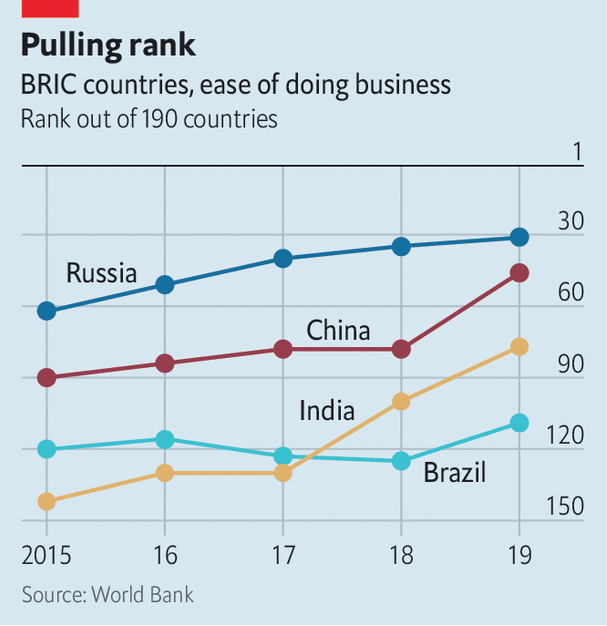This graph in The Economist caught my eye:

The graph shows big jumps for several countries in the World Bank’s “Ease of Doing Business” rankings. This seems like good news.
On second thought, rankings are a zero sum game, so maybe it’s not good news.
On third thought, more than 1/3 of humans live in India and China, so perhaps it is good news after all.
On fourth thought, it appears these countries were gaming the system, at least to some extent:
How did they do it? And how credible is their progress? In an ideal world, countries would rise in the World Bank ranking as a welcome by-product of reforms undertaken for their own sake. But India and China are among the 60-plus countries that have government units dedicated to moving upwards, almost as if it were an end in itself.
China’s comprises about 40 people; India’s perhaps 200, plus others working on state-level scorecards. Many teams visit the bank to learn precisely how the scores are calculated. India’s now thinks it could mark its own exam. It announced, long before the bank’s official assessment, the score it felt it “should” receive.
On fifth thought (and I promise this is my last word on the subject), maybe it is good news. While teaching to the test is far from the optimal approach to education, surely it leads to at least some useful learning. Similarly, while trying to do reforms that move a country up the World Bank ranking is far from the optimal approach, it’s likely that these efforts yield at least some useful reductions in red tape:
The rankings also loom large in Russia. Vladimir Putin, its president, set an ambitious target to rise by 100 places in six years. That proved impossible. Russia has instead risen by 89 places in seven years. This steady progress says a lot about the ingenuity of its reform unit. It says less about Russia’s actual friendliness to business. Compare, for example, its positions in the Doing Business report (31st) and the corruption index produced by Transparency International, an ngo(135th).
Russia’s manoeuvres may, however, have motivated more genuine reforms elsewhere. Mr Putin’s target possibly helped inspire Mr Modi in 2014 to set one of his own: to move India into the top 50 countries by 2019. India’s rapid progress on this front seems in turn to have galvanised China’s efforts.
Progressives often talk of a “race to the bottom” on corporate tax reform. I don’t agree. But surely we can all agree that a “race for the top” on reducing red tape is a useful form of international competition.
PS. David Beckworth has a new podcast where he interviews me on monetary policy. It was recorded at the University of Texas a few weeks ago.

READER COMMENTS
derek
Nov 15 2018 at 9:04am
Can I ask how you distinguish between national reductions in corporate income tax as not being a race to the bottom in this post, but state tax exemptions for specific corporations as “wasteful interstate competition” in your recent Money Illusion post?
Obviously, a major difference is that the state/city-level Amazon subsidies are essentially singling out a winner; although it would be ideal for all corporate taxes to be lower, the worst-case scenario is to introduce further market distortions by selectively lowering a single company’s rate. If this is a correct reading of your views, would you have little problem with states trying to attract Amazon by lowering their corporate/property tax rates for everyone?
Finally, if that would indeed be acceptable policy, how do you feel about states like Florida, which charges its citizens no income tax but receives massive federal subsidies basically every single year in the form of hurricane relief? This may seem unrelated to a corporate race to the bottom, but Florida is clearly competing for retirees’ spending, and it seems like a market distortion for the essentially known cost of having major population centers in Florida to be subsidized by federal taxpayers. (Not trying to pick on Florida, it just came to mind as an example.)
Scott Sumner
Nov 16 2018 at 9:19pm
Derek, Yes, I support cutting the tax rate for all corporations.
I oppose Federal disaster relief for Florida, or any other state.
Comments are closed.